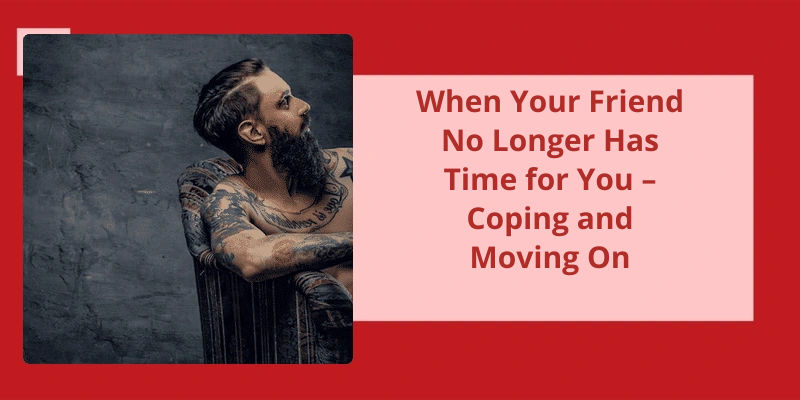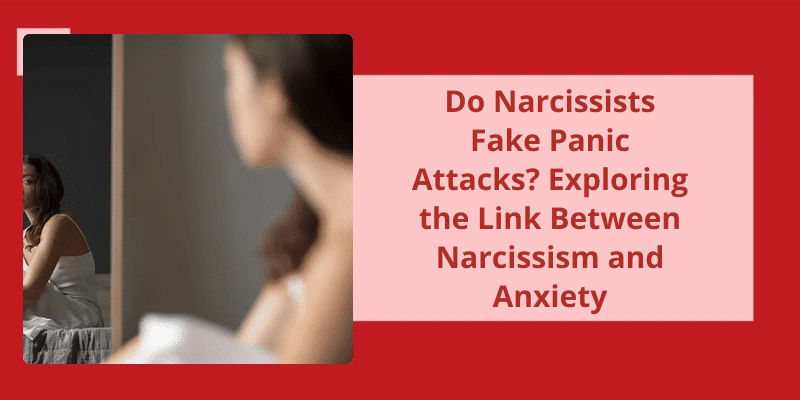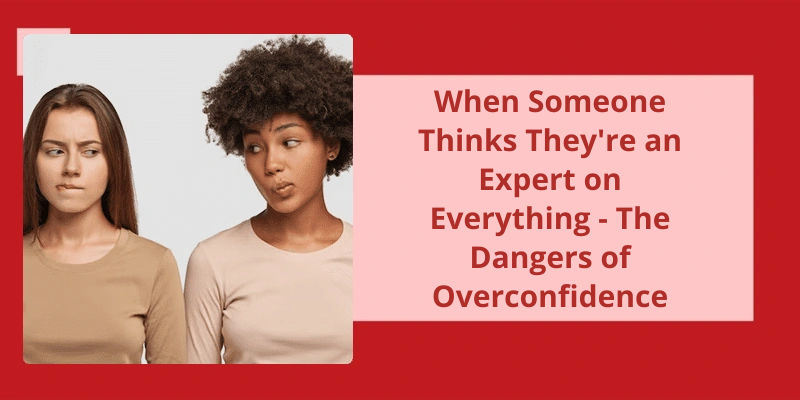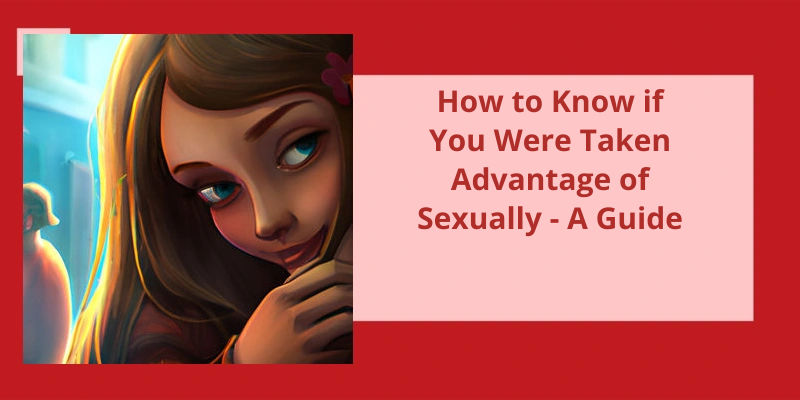It's a common occurrence in life that people's priorities change over time, and that can often mean that friendships can fade away. This can be especially difficult when you find yourself in the position of being the friend who’s suddenly left with a lot of free time on your hands. Whether it's due to your friend's new job, a relationship or family commitments, it can be tough to come to terms with the fact that your once-close friendship may be petering out. Coping with this change can be a challenging process that requires time, understanding, and a willingness to reflect on the relationship you once had.
Why Do Friendships End Abruptly?
Friendships are essential pillars of support and companionship in our lives. They’re part of our social support networks, influencing our well-being and our emotional development. However, it’s not uncommon for friendships to end abruptly, without warning, leaving behind a bitter aftertaste. There are various potential reasons why a friendship might end suddenly.
Changes in expectations is one factor that can drive friends apart. When people enter a friendship, they often have certain expectations about how things should run. It could be something as small as frequency of communication or as significant as how much time you spend with each other. These informal agreements can change over time due to unforeseen circumstances, which may result in one person becoming unhappy with how things are going, eventually leading to a rupture in the relationship.
Friendships aren’t always free of disagreements, misunderstandings, or hurt feelings. However, if these disputes mount and become intense, they can cause both parties to cut ties with each other entirely. This could be as a result of a minor argument that escalates or a significant betrayal that breaches trust.
Outgrowing each other is a frequent reason why youthful friendships suddenly end. Personal growth and development can have a profound impact on a persons life. A friend who was once a perfect match may become less appealing, and their interests may cease to overlap over time. This could lead to reduced communication, and before you realize it, the relationship is no longer existent, bringing an end to a once-strong bond.
Another potential cause is a lack of emotional support and reciprocation. When we enter friendships, were looking for people who can support us emotionally when we need it. If a friend is consistently unable or unwilling to be there for us and gives little or no support when we need it, it can result in a rupture of the relationship. People who’re friends only in times of need and are unwilling to reciprocate emotional support are those whose friendships tend to end abruptly.
Distance and Lack of Communication: When Friends Move Away or Become Busy With Their Own Lives, It Can Be Challenging to Maintain Regular Communication. If the Lack of Communication Persists for Too Long, the Friendship May Begin to Feel Strained and Eventually Fade Away.
Sometimes friends move away or get busy with their own lives, and it can be tough to stay in touch. If this goes on for too long, the friendship can start to feel strained and eventually fade away.
Maintaining friendships can be difficult, and sometimes relationships can run their course. It can be challenging to determine when someone doesn’t want to be your friend anymore, but there are several warning signs to look out for. Paying attention to these signs can help you understand when it’s time to accept that a friendship may be over. In this article, we’ll explore eight signs that someone doesn’t want to be your friend anymore.
How to Tell When Someone Doesn T Want to Be Your Friend Anymore?
Friendship is one of the most valuable and meaningful things in life. A true friend will always be there for you through thick and thin, and support you no matter what. However, sometimes friendships can fade away, and it can be difficult to tell when someone no longer wants to be your friend. Here are some signs to look out for:
One of the most obvious signs that someone doesn’t want to be your friend anymore is when you put in most of the effort. If youre always the one initiating contact, planning hangouts, and trying to keep the friendship alive, it might be a sign that the other person isnt as invested as you are.
Another red flag is when the other person actively avoids connecting deeply with you. This could mean that they avoid talking about serious topics, shy away from intimate conversations, or never really open up to you emotionally. If theyre not willing to share their thoughts and feelings with you, it might be a sign that theyre not interested in building a deeper connection.
If someone doesn’t ask about you or your life, it could be a sign that theyre not interested in maintaining the friendship. A true friend will always be curious about your life, ask about your interests, and genuinely want to know how youre doing. If the other person doesn’t seem to care, it could be a sign that theyre moving on.
When someone stops reaching out or making plans with you, it’s a clear indication that theyre not interested in spending time with you anymore. If they don’t respond to your texts or calls, or never initiate contact themselves, it might be time to accept that the friendship is over.
They might give reasons like being too busy, or having other commitments, but if it seems like theyre always trying to get out of spending time with you, it’s time to move on.
How to Recognize When You Might Be Holding Onto a Toxic Friendship.
- You constantly feel drained after spending time with them
- They only talk about themselves and never ask about you
- They’re quick to judge and criticize you
- They make you feel guilty for setting boundaries
- They bring drama and chaos into your life
- You’ve to walk on eggshells around them
- They never apologize or take responsibility for their actions
- You don’t feel supported or valued in the relationship
- They constantly compete with you or try to one-up you
- Your gut tells you that something is off in the friendship
Maintaining friendships can be a challenging task, and sometimes it becomes necessary to let go of them. It’s natural to outgrow people, and it doesn’t necessarily mean that one person is better than the other. Sometimes, priorities change, and people have different goals and lifestyles. However, it’s essential to recognize the signs of a fading friendship and acknowledge when it’s time to move on. In this article, we’ll talk about when and how to let go of a friendship that no longer serves you.
When Should You Let a Friendship Fade Away?
Friendships are an important aspect of life, but it’s natural for them to end at some point. One common reason why friendships fade away is because people grow apart. Life happens and people start taking different paths which sometimes leads to less time spent together and less common interests. If this is the case, it’s okay to let the friendship fade away. It’s not a reflection of anyones character or worthiness.
Friendships are a two-way street, and if it feels like youre doing all the work to maintain it, it’s okay to take a step back and let it go. It’s important to have people in your life who uplift you and you can rely on. When there’s no longer a balance, it may be time to reassess the friendship.
Trust and reliability are also important factors in friendships. If you find that you cant rely on your friend or that they’ve betrayed your trust, it may be time to let the friendship go. Healthy relationships are built on trust, and if that foundation is broken, it’s difficult to repair the friendship. While forgiveness is important, it doesn’t mean that the friendship needs to continue.
Sometimes friendships come to an end due to conflicts or disagreements. It’s important to remember that it’s okay to have different opinions and values, but when those differences lead to constant fighting or tension, it may be time to let the friendship fade away. It’s important to surround yourself with people who bring positivity and support to your life.
People change and priorities shift, and what was once a meaningful friendship may no longer have the same impact on your life. It’s important to recognize when a friendship has run it’s course and move on without guilt or shame.
It’s important to pay attention to your gut feelings when it comes to friendships. While it may be difficult to let go of someone you once cared about, it’s important to prioritize your own well-being and surround yourself with people who uplift and support you. It’s important to trust yourself and know that you deserve loving and healthy relationships.
Source: Is it best to let a friend know that you’re ending …
Building genuine and long-lasting friendships requires mutual respect, care, and understanding. However, at times, you may find yourself questioning the sincerity of your friend’s intentions towards you. As we delve further into the various signs that indicate a lack of value and care in a friendship, take note of their behavior and assess whether they embody the essence of a true friend.
How Do You Know if Your Friend Doesn’t Value You?
If your friend seems to bring you down or doesn’t seem to be happy for your achievements, it might be a sign that they don’t value your friendship and don’t care about your well-being. Another telltale sign that your friend might not value you is if they’re never there for you when you need them. Friendship is a two-way street, and if your friend isn’t actively trying to support or help you when you need it, they might not value your friendship as they should.
Sometimes, people who don’t value their friendships might also be prone to belittling or mocking you in front of others. This can often happen when the friend themselves isn’t feeling secure in their own life and uses your accomplishments to make themselves feel better. It’s important to recognize when this kind of behavior is happening and to distance yourself from people who engage in it. In fact, one of the best things you can do for yourself is to surround yourself with people who genuinely support and want the best for you.
Another way to tell if your friend doesn’t value you is if they’re always canceling on plans or showing up late. While it’s important to understand that sometimes situations can be out of our control, consistently canceling or being late can be a sign that your friend doesn’t take your time seriously. After all, our time is one of our most precious commodities, and if your friend doesn’t value it, that could be a sign that they don’t value you either.
Lastly, if your friend is always talking about themselves and not showing any interest in your life or whats important to you, it could be a sign that they don’t value your friendship. Genuine friends ask questions and take an interest in whats going on in each others lives.
How to Confront a Friend Who Doesn’t Value You
- Choose the right time and place to confront your friend. Make sure it’s a private and quiet setting where you can both talk without distractions.
- Be honest and straightforward about how you feel. Use “I” statements to avoid sounding accusatory.
- Listen to your friend’s response and try to understand their perspective.
- Express how their behavior has affected you and ask for what you need from them in the friendship.
- Be willing to compromise and work together to find a solution.
- If your friend doesn’t show any effort or willingness to change, consider if the friendship is still healthy for you.
- Remember that it’s okay to distance yourself from toxic friendships and prioritize your own well-being.
Navigating the end of a friendship can be challenging, especially when it feels like the other person doesn’t care about your feelings. However, there are steps you can take to manage the situation and move forward. In this article, we’ll explore what to do when a friend hurts you and doesn’t seem to care, including talking to them, setting clear expectations, creating distance, practicing compassion, and seeking support if needed.
What to Do When a Friend Just Doesn T Care About You Anymore?
It can be a heartbreaking experience to find out that a friend doesn’t care about you anymore. It can be especially challenging to navigate this situation as we naturally want to hold onto our friendships and avoid conflict. However, one of the possibilities when a friend hurts you and doesn’t care is to confront them about it and talk things out. It can be challenging to gather the courage to do this, but it can lead to a resolution and closure in the situation.
Another way to handle a friend that doesn’t care is to set clear expectations. Setting boundaries and clearly communicating our expectations is a critical aspect of any relationship. It may be helpful to tell your friend how you feel and what you need from the relationship. By setting clear expectations, you’re creating a framework for the relationship to operate within, allowing both people to understand what’s expected of each other.
Sometimes, distance may be the best approach to saving yourself from further disappointment. If your friend doesn’t seem to care about you anymore, it might be necessary to take a step back and limit your interaction with them for a while. While the idea of pulling away may be difficult to consider, it could bring about introspection on the part of the friend and a chance to reevaluate the relationship.
As you distance yourself from your friend, it may also be an opportunity to practice compassion. Although it’s easy to feel hurt and resentful, try to understand why the friendship has faded or why your friend doesn’t seem to care about you anymore.
Finally, if dealing with a friend that doesn’t care becomes too overwhelming, it’s essential to seek help. This help could be from a professional, such as a therapist, or from a trusted confidante. Having someone to vent to and share your feelings with can make a big difference and provide a safe environment to work things through.
Talk to your friend, set clear expectations, distance yourself, practice compassion, and seek help if needed. By following these steps, you may be able to move forward from this difficult situation and possibly repair or salvage the friendship.
How to Recognize Signs That a Friend Doesn’t Care About You Anymore
Recognizing signs that a friend doesn’t care about you anymore includes things like them not initiating contact or canceling plans often. They may seem disinterested when you talk to them or not make time for you anymore. Picking up on these cues can help you decide how to approach the situation.
Conclusion
Losing a close friend due to a lack of time can be a difficult and gut-wrenching experience. It can leave you feeling sad, frustrated, and even angry. However, it's important to remember that everyone's priorities and schedules change over time, and it's not always a reflection of their feelings towards you. It's essential to communicate your thoughts and emotions in a constructive manner and respect their choices. Sometimes, friendships need to ebb and flow with the changing tides of life. The crucial thing is to cherish the moments you’d together, and if your paths cross again in the future, you can rekindle the special bond you once shared. In the end, quality over quantity should be the representation of a strong friendship.






